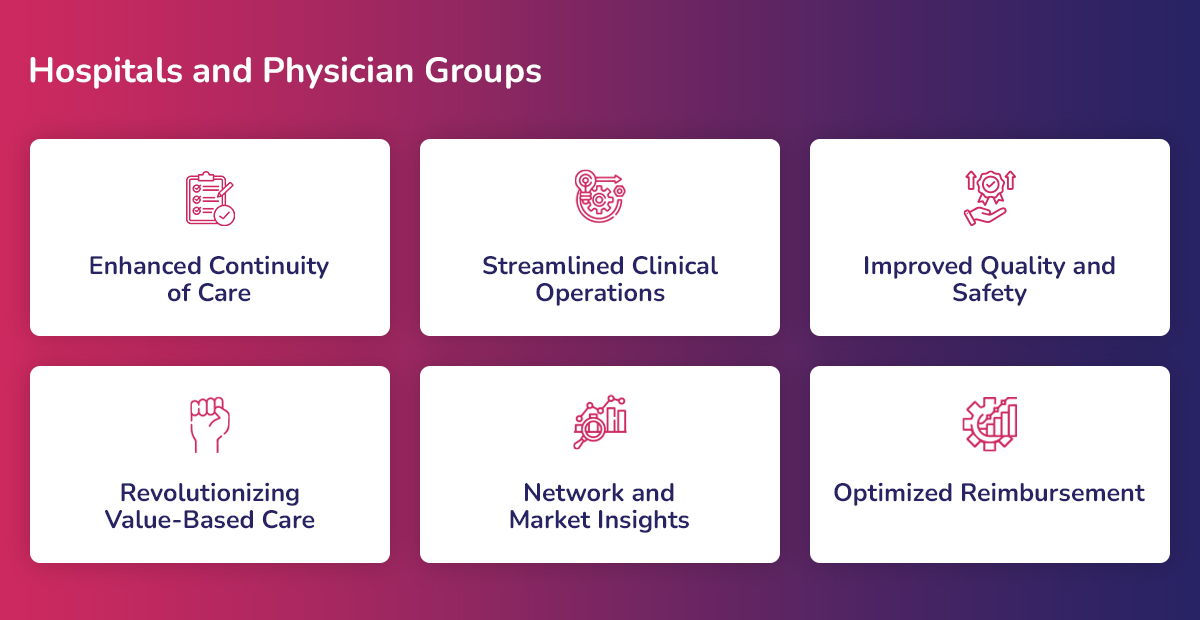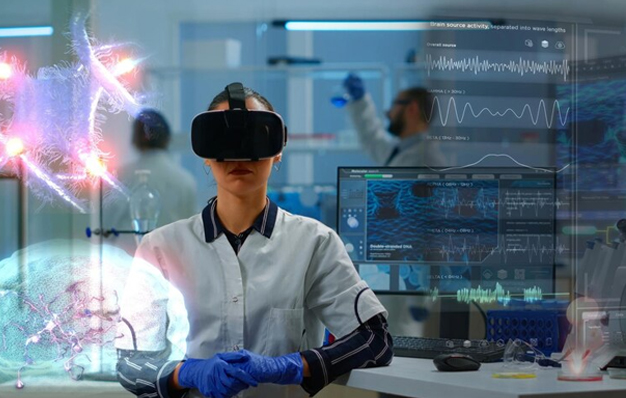Healthcare is inundated with unstructured data, but generative AI (gen AI) offers a solution. By utilizing deep-learning algorithms, gen AI can transform unorganized data into valuable insights. This technology has the potential to revolutionize healthcare operations and unlock an estimated $1 trillion of improvement potential within the industry. However, it’s crucial to integrate gen AI models into existing analytics and AI roadmaps while acknowledging associated risks, such as data security and occasional inaccuracies. Healthcare organizations can start by applying gen AI to administrative and operational tasks before advancing to clinical applications.
How Private Payers and Healthcare Providers Can Leverage Gen AI
Soon, insurance executives, hospital administrators, and physician group operators can potentially leverage gen AI technology across various aspects of the healthcare value chain, impacting areas like continuity of care, network and market insights, and value-based care.
1) Private Payers
Consumers are demanding more personalized and convenient services from their health insurance providers. Simultaneously, private payers face mounting competitive pressure and escalating healthcare costs. Here’s how Gen AI can help:
- Streamlining Operations: Gen AI can automatically summarize vast amounts of data, freeing up human resources to address complex needs. Core administrative functions, member services interactions, and provider interactions all involve sifting through large volumes of data. Gen AI can automatically summarize this data, regardless of the volume, allowing personnel to focus on more intricate issues.
- Enhanced Member Services: Gen AI can significantly improve the quality and efficiency of member interactions. For instance, many member inquiries revolve around benefits, traditionally requiring manual confirmation by insurance specialists. With gen AI, digital resources and call center specialists can efficiently retrieve relevant information from a multitude of plan types and files. Additionally, gen AI models can expedite and improve claim denial resolutions, a time-consuming process that often leads to member dissatisfaction. These models can summarize denial letters, consolidate denial codes, highlight relevant reasons, and provide context and next steps for managing denials, all under human supervision.
- Expedited Processes: Gen AI-powered technology can streamline health insurance prior authorization and claims processing, two arduous and costly tasks for private payers. Currently, verifying prior authorization can take an average of ten days. Gen AI products can convert unstructured data into structured data, enabling near-real-time benefits verification, including accurate calculations of out-of-pocket costs using healthcare providers’ contracted rates and patients’ exact benefits.
2) Hospitals and Physician Groups
Gen AI technology has the potential to revolutionize various aspects of hospitals and physician groups, impacting continuity of care, clinical operations, contracting, and corporate functions.
Enhanced Continuity of Care: Imagine a hospital discharging a patient and using gen AI to generate discharge summaries or instructions tailored to the patient’s native language, ensuring better understanding. Additionally, gen AI can synthesize care coordination notes or shift-handoff notes, create checklists and lab summaries from physician rounds, and generate clinical orders in real time. This technology’s ability to generate and synthesize language can significantly improve EHR functionality.
Traditionally, EHRs allow providers to access and update patient information but often require manual inputs and are prone to human error. Hospitals and physician groups are actively testing gen AI for various tasks, including pre-populating visit summaries in the EHR, suggesting changes to documentation, and providing relevant research for decision support. Some health systems have already begun integrating these systems into their operations as part of pilot programs.

Streamlined Clinical Operations: Hospitals and physician groups are notorious for their mountains of paperwork. Providers and administrative staff are burdened with completing dozens of forms per patient, not to mention post-visit notes, employee shift notes, and other administrative tasks that consume valuable time and contribute to burnout. Gen AI, with appropriate clinician oversight, can potentially generate:
- Discharge summaries or instructions in the patient’s native language
- Care coordination notes or shift-handoff notes
- Checklists
- Lab summaries from physician rounds
- Clinical orders in real-time
Gen AI’s ability to process language can also improve how EHRs function, potentially reducing manual data entry and minimizing errors.
Improved Quality and Safety: Gen AI has the potential to enhance quality and safety in healthcare delivery. Imagine a system that can synthesize and recommend tailored risk considerations for patients based on their medical history and existing medical literature. This could be a game-changer for preventative care and early intervention.
Revolutionizing Value-Based Care: Value-based care models reward providers for delivering quality care at a lower cost. Here’s where Gen AI shines:
Improved Documentation Accuracy: Gen AI can assist with documentation accuracy, a crucial element of value-based care programs.
Patient Education: Gen AI can leverage structured and unstructured data to create patient education videos, images, and summaries, promoting patient engagement and better health outcomes.
Standardized Contracts: Gen AI can draft standard value-based care and carve out contracts based on market characteristics, streamlining the contracting process.
Network and Market Insights: Gen AI can automate tasks like generating provider segmentation summaries by specialty, summarizing market performance, and comparisons based on external resources and data. This empowers healthcare leaders to make data-driven decisions for network development and market positioning.
Optimized Reimbursement: Gen AI can play a role in optimizing reimbursement by,
- Developing prior authorization documentation for payers
- Generating a list of current conditions and potential codes based on various data sources like voice recordings, electronic medical records, and text
- Creating care management summaries identifying coding errors across claims
- Automating coding and checks based on physician notes
3) Bringing Gen AI to Healthcare
While gen AI holds immense promise for transforming healthcare, successful implementation requires careful consideration of an organization’s operational capabilities, talent pool, and technological infrastructure. Here are some steps healthcare leaders can take:
- Evaluate the Landscape: The first step is to determine how gen AI can best serve the organization. Leaders should create a cross-functional team, including data and technology experts, to identify the most relevant applications across various departments. This collaborative approach avoids an ad-hoc or piecemeal approach, ensuring efficient and effective gen AI integration into existing workflows. These identified use cases should then be prioritized and incorporated into the organization’s broader AI roadmap.
- Data Matters: Extracting maximum value from gen AI requires access to broad, high-quality data sets. Healthcare leaders should explore strategic partnerships with providers, payers, or technology vendors to improve data fidelity and accuracy. Additionally, investments in interoperability are crucial for seamless data exchange. Leaders should also assess their existing AI tech stack, including applications, models, APIs, and other technological infrastructure, to determine what needs augmentation to leverage large language models effectively. Early investments in the AI tech stack will pave the way for future-generation AI applications. It’s vital to ensure data processing happens within secure firewalls for training gen-AI models. Based on internal capabilities, organizations may choose to outsource specific parts of their tech stack.
4) Addressing Risks and Bias
For private payers, hospitals, and physician groups, several potential risks are associated with gen AI, particularly during its early stages of development. Here are some key considerations:
- Data Security: its training models. If the data sets used to train a gen-AI platform are skewed towards certain patient populations, the generated care plans could be biased, potentially providing inaccurate, unhelpful, or even harmful information to patients.
- Integration Challenges: Integrating gen-AI platforms with other hospital systems, like billing systems, can lead to inefficiencies and erroneous expenses if not done meticulously.
- Human Oversight: Given the potential for gen AI to generate inaccurate outputs, a “human-in-the-loop” approach remains critical. Leaders should establish risk and legal frameworks governing gen AI use within their organizations. These frameworks should prioritize data security, mitigate bias ensure fairness, and promote regulatory compliance and accountability.
5) Invest in People and Partnerships
The introduction of gen AI into healthcare organizations will fundamentally change not only how work is done but also by whom. Healthcare professionals will see their roles evolve as gen AI streamlines certain tasks. However, a human-in-the-loop approach will remain essential. While many processes will undergo significant changes, and the way people work may look different, human expertise will still be critical in all areas touched by gen AI.
Here’s how healthcare organizations can prepare their workforce for this shift:
- Upskilling the Workforce: Organizations must provide learning resources and guidelines to help employees understand how to leverage gen-AI platforms, evaluate recommendations, and intervene when errors occur. Essentially, AI should augment human capabilities, not replace them.
- Prioritizing User Experience: Within hospitals and physician groups, where burnout is already prevalent, leaders should prioritize user experience. Gen-AI applications should be as user-friendly as possible for frontline staff, avoiding additional workloads or taking time away from patient care.
- Strategic Partnerships: While some healthcare organizations may choose to develop their gen-AI capabilities, most will likely require strategic partnerships with technology firms. Before selecting a partner, leaders should consider the following factors:
- Regulatory Compliance: Does the potential partner adhere to relevant regulations, such as HIPAA in the US, and prioritize data privacy and security?
- Data Usage: Will the healthcare organization’s data be used to inform future foundational models by the partner?
There’s also potential for private payers and healthcare providers to collaborate with other organizations possessing rich data sets. This collaborative approach can improve gen-AI outputs for everyone involved.
6) The Future of Healthcare with Generative AI
Gen AI has the potential to revolutionize healthcare in ways unimaginable with previous technologies. As gen AI matures, it could converge with other emerging technologies like virtual and augmented reality or other forms of AI to further transform healthcare delivery. Imagine a healthcare provider licensing their likeness and voice to create a branded visual avatar for patient interaction. Or, a physician could compare their approach to a specific patient against the full corpus of similar patients who experienced positive outcomes. While these scenarios might seem futuristic, they hold significant potential as gen AI continues to advance.
However, the responsible and safe use of this technology should be a top priority for private payer, hospital, and physician group leaders. Protecting patient privacy, ensuring equitable clinical outcomes, and enhancing the experience of healthcare providers are all paramount goals. Taking the first step today is crucial to achieving these goals and unlocking the immense potential of gen AI in transforming healthcare for the better.




